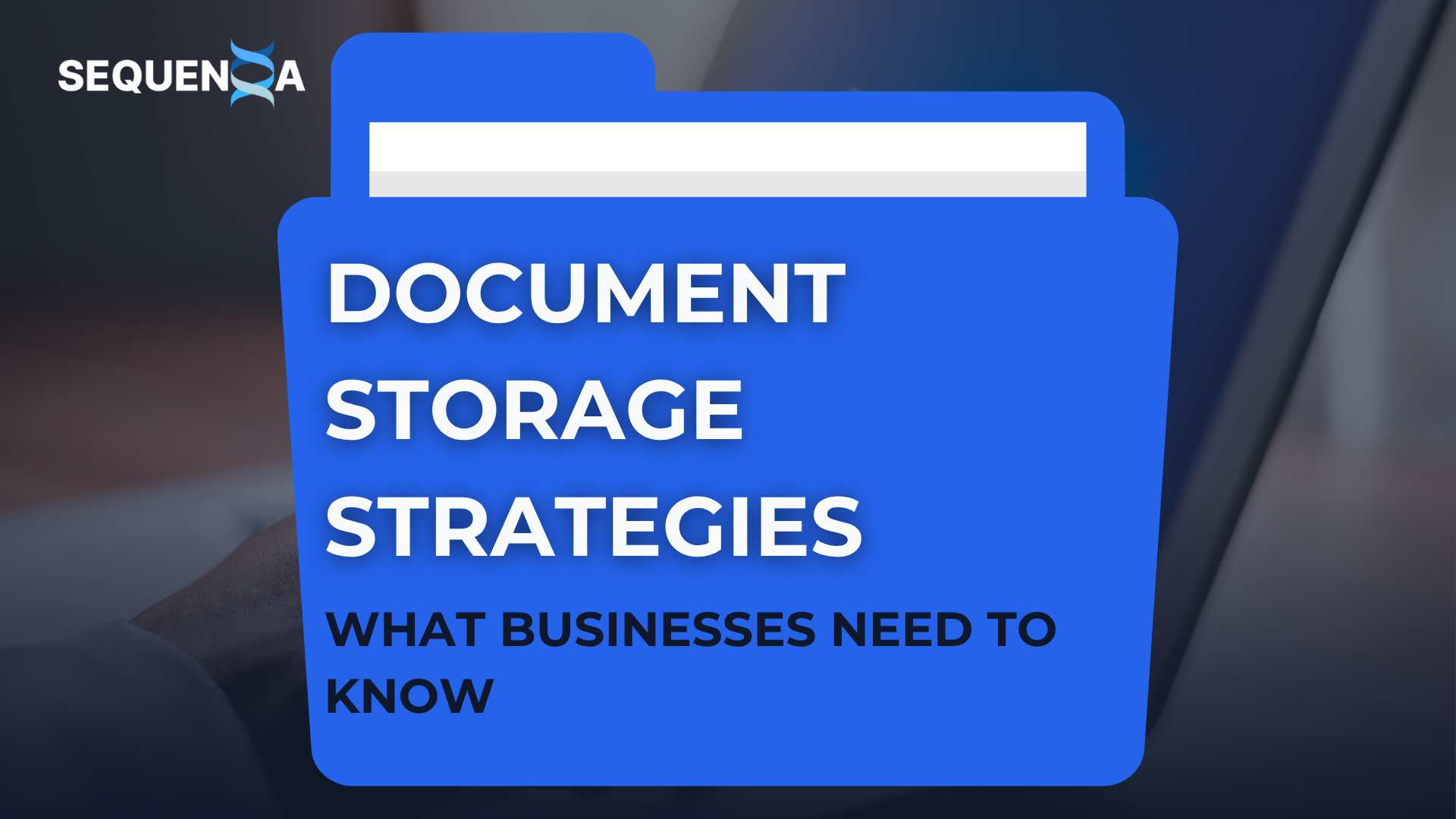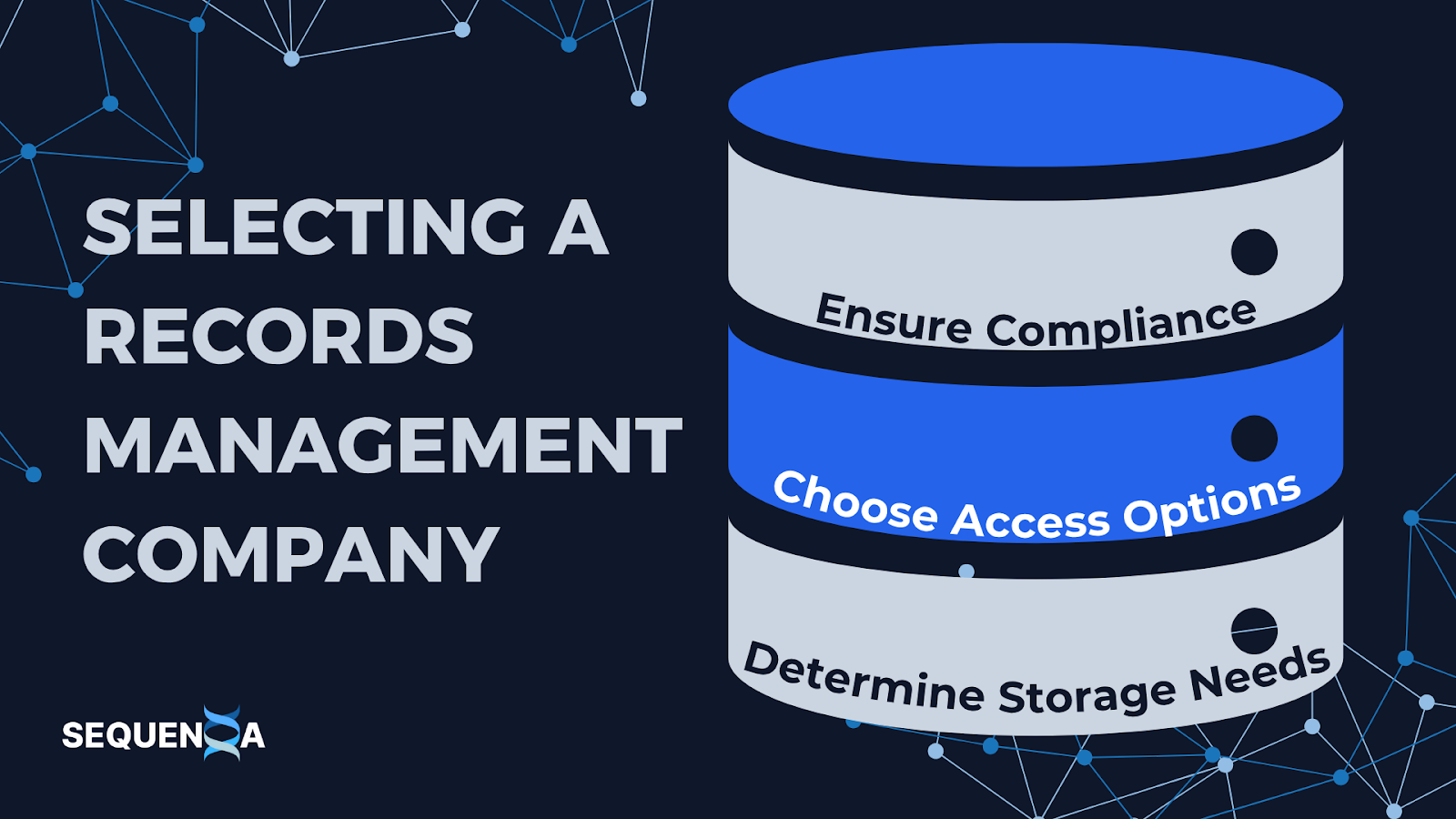Document Storage Strategies: What Businesses Need to Know

Paper chaos, missing records, and overwhelmed admin teams, these aren’t just annoyances, they’re operational liabilities. As businesses scale, regulatory demands tighten, and hybrid work becomes the norm, the need for reliable and secure offsite storage solutions is more urgent than ever.
This guide breaks down everything you need to know about off site document storage, from choosing a document storage facility, to weighing offsite file storage against digital record storage, and how the right strategy helps you stay compliant and efficient. We'll cover common use cases, real-life examples, FAQs, and expert-backed advice.
Why Onsite File Storage No Longer Works
Keeping paper files in filing cabinets or office closets might seem cheap, but it's far from cost-effective or secure.
Real Estate Waste
Keeping physical files in high-value office space significantly drives up your operational costs. Each filing cabinet or storage room consumes square footage that could otherwise be used for revenue-generating activities or downsized to reduce your cost per square foot.
Increased Labor Load
Manual document handling takes a toll on productivity. Employees spend hours retrieving, re-filing, and managing paper records, time that could be redirected toward strategic tasks. This inefficiency also increases the likelihood of human error and misfiling.
Lack of Disaster Recovery
Storing important documents onsite without backup measures exposes your business to serious risks. Fires, floods, or theft can instantly destroy irreplaceable records, leaving you with operational and legal liabilities. Offsite storage with disaster recovery protocols is essential for safeguarding your data.
Example: A legal consultancy in Denver freed up two entire offices by transferring 12 years of case files to an offsite records storage facility, repurposing that space for billable workstations.
Would digital indexing cut your retrieval time in half? Let Sequenxa turn piles into searchable archives.
Choosing the Right Offsite Document Storage Provider
Not all offsite storage vendors offer the same level of protection or service, knowing what to look for is key.
Security Standards
Prioritize facilities that offer 24/7 video surveillance, secure access controls like keycard or biometric entry, and climate-controlled environments to protect sensitive physical records. These features help prevent unauthorized access and deterioration from temperature or humidity fluctuations.
Regulatory Alignment
Ensure the provider is prepared to meet compliance requirements for regulations such as HIPAA, SOX, or FINRA. This often involves strict data handling protocols, staff training, and documented procedures that meet legal and industry-specific standards.
Accessibility Tools
Look for advanced document management features like barcoding, indexing, and digital tracking to streamline retrieval. On-demand access, whether physical or digital, helps reduce downtime and improves operational efficiency.
Audit Trails
A reputable records storage provider should maintain comprehensive audit logs of all file movements, accesses, and changes. These logs are essential for legal compliance and internal accountability, especially during audits or investigations.
Did you know? 68% of companies experienced a data breach involving paper documents due to poor storage controls (Ponemon Institute, 2023).
“Choosing the wrong storage provider can expose your business to compliance violations, especially in regulated industries.”
Unsure your storage vendor meets HIPAA or SOX? See the compliance questions top auditors will ask
The Value of Long Term Document Storage
Long-term recordkeeping isn’t just about regulatory compliance, it’s about institutional memory and risk reduction.
Retention Laws
Legal, HR, and financial documents often come with strict retention requirements, some must be stored for 7, 10, or even up to 30 years depending on the jurisdiction and industry. Failing to adhere to these mandates can result in penalties or legal complications.
Proof of Compliance
A professional records storage facility helps preserve the integrity of your documentation by maintaining secure and organized archives. This ensures you have a verifiable paper trail available for audits, regulatory reviews, or legal disputes when needed.
Data Continuity
Just because documents are stored offsite doesn’t mean they should be forgotten. Reliable storage providers ensure your records remain easily retrievable, secure, and well-managed, supporting operational continuity and long-term data integrity.
“Records storage isn't about hoarding paper, it's a legal and financial safeguard that protects your business for decades.”
Who Needs Secure Offsite Storage the Most?
Some sectors face more risk from poor document control than others, especially where compliance is critical.
Healthcare
HIPAA compliance mandates meticulous secure records storage for sensitive patient files. Healthcare providers must protect electronic and physical health records from unauthorized access, loss, or breach. This means using secure offsite storage for paper files and digital record storage systems that meet strict encryption and access control standards.
Finance & Insurance
These industries face stringent legal, tax, and fiduciary obligations, making long term document storage essential for compliance. Auditors and regulators frequently request access to historical data, necessitating offsite records storage that ensures integrity, confidentiality, and easy retrieval. Partnering with records storage facility experts helps firms avoid compliance penalties and reputational risk.
Construction & Real Estate
Contracts, permits, zoning documentation, and blueprints must often be preserved for years due to litigation risks and warranty periods. These industries benefit from physical document storage combined with document archiving services to organize and retrieve critical files quickly. A document storage facility can ensure long-term safekeeping and quick accessibility during project reviews or audits.
Government Contractors
Federal and state contracts come with high scrutiny. Contractors are often subject to oversight from multiple agencies and must maintain airtight audit trails. Utilizing records management storage facilities and record storage services ensures full compliance with government documentation standards. These services provide protection against non-compliance and strengthen an organization’s readiness for surprise inspections or audits.
Did you know? Companies in regulated sectors are 4.5x more likely to be audited for recordkeeping violations (Bloomberg Compliance Report, 2023).
Still renting square footage for paper? Explore smarter off-site strategies in our compliance guide
Offsite vs. Digital Record Storage: Which Is Better?
Businesses often ask whether they should go fully digital, or if physical document storage still has a place
Active vs. Archived
Managing both live and legacy documents requires a balanced approach. Recent and frequently accessed files are best stored in digital record storage systems for quick retrieval, collaboration, and editing. In contrast, older or inactive files, such as closed client accounts, past financial statements, or expired contracts, should be transitioned to offsite records storage or an off site document storage facility to free up internal space while preserving compliance and accessibility.
Risk Mitigation
Reliance on digital systems alone exposes organizations to threats like cyberattacks, system failures, or accidental deletion. Maintaining physical document storage as a backup provides an essential layer of protection. Secure offsite storage facilities offer controlled environments and disaster-recovery-ready systems that act as a failsafe when digital systems are compromised.
Compliance Versatility
Despite digital advancements, many industries still face regulations requiring physical documents, original signatures, or notarized forms. Offsite file storage and records management storage facilities allow businesses to meet these paper-based compliance needs without cluttering their offices. This dual-format approach helps companies remain agile and audit-ready across various regulatory frameworks.
“Smart businesses combine the speed of digital with the security and permanence of physical offsite storage.”
Could a hybrid approach reduce your data loss risk while improving accessibility?
How Document Archiving Services Streamline Compliance
Archiving isn’t just about decluttering, it's about better decision-making, faster access, and legal protection.
Version Control
Professional document archiving ensures that only the most current and authorized versions of files are accessible across teams. This eliminates confusion and reduces the risk of errors caused by outdated or conflicting file versions circulating within the organization.
Centralized Indexing
With centralized indexing, all archived documents are tagged, categorized, and searchable from a single access point. This allows employees to retrieve even years-old records within seconds, improving productivity and reducing time wasted on manual searches.
Retention Scheduling
Automated archiving systems enable you to assign retention periods to documents based on compliance needs. This ensures that records are disposed of at the right time, reducing storage clutter and helping your organization avoid fines for over-retention or improper disposal.
Did you know? Businesses with formal document archiving services report 2x faster audit completion times (AIIM, 2023).
Think cloud storage alone is enough? Learn why smart companies go hybrid.
Selecting a Records Management Company That Delivers
The right records management company should offer more than a warehouse, they should be a compliance partner.

Consultative Planning
A full-service record storage company should begin with a thorough consultation to evaluate your document lifecycle. They help you determine which records are essential to store physically, which can be digitized for faster access, and which are safe to destroy, aligning with your operational and compliance needs.
Flexible Access Options
Look for providers that offer multiple ways to access your documents, such as scheduled physical pickups, scan-on-demand services for urgent needs, and secure online dashboards for 24/7 digital access. This level of flexibility supports both remote and onsite teams efficiently.
Compliance Expertise
Reputable record storage companies bring in-depth knowledge of industry-specific retention schedules, data privacy laws, and regulatory audit trails. Their guidance helps safeguard your organization from non-compliance risks and ensures that your storage practices are always up to legal standards.
“A good records management partner makes sure you’re not just storing files, but storing them right.”
Does your current provider offer compliance consulting? Sequenxa goes beyond storage, we help you stay audit-ready.
FAQs
What is offsite storage?
It refers to storing documents in a facility outside your primary business location, usually for enhanced security, compliance, and cost savings.
What is long term document storage?
The process of storing physical or digital records for several years to meet legal and operational requirements.
Who needs offsite file storage?
Industries with heavy documentation such as law, healthcare, finance, and government contracting.
Are offsite storage solutions secure?
Yes, top providers offer climate control, 24/7 surveillance, biometric access, and disaster-proof infrastructure.
What are record storage services?
They include document pickup, indexing, secure storage, digital scanning, and scheduled destruction services.
What makes a good document storage business?
Strong security, regulatory compliance, easy access, and long-standing industry expertise.
What’s the difference between offsite records storage and digital storage?
Offsite storage refers to physical files housed externally. Digital storage involves cloud-based or local electronic document management.
Your Records Might Be Safe, But Are They Strategic?
File storage isn’t just about keeping paperwork out of sight, it’s about having access, control, and compliance readiness. Whether you’re running a multi-office enterprise or a growing SMB, the risks of poor records management, from failed audits to lost productivity, are too high to ignore.
Can Your Business Survive a Records Audit Tomorrow? Sequenxa helps businesses implement efficient, compliant, and scalable offsite storage solutions that fit your specific document lifecycle, from creation to final destruction.
References
Ponemon Institute. (2023). Paper Document Breach Risk. Retrieved fromhttps://www.ponemon.org
Bloomberg Compliance. (2023). Regulatory Risk Report. Retrieved fromhttps://www.bloomberg.com
AIIM. (2023). Intelligent Information Management Benchmark. Retrieved fromhttps://www.aiim.org
FreightWaves. (2023). A small carrier used social media marketing to attract direct shipper contracts, reducing their reliance on brokers and increasing profit margins by 20%.



